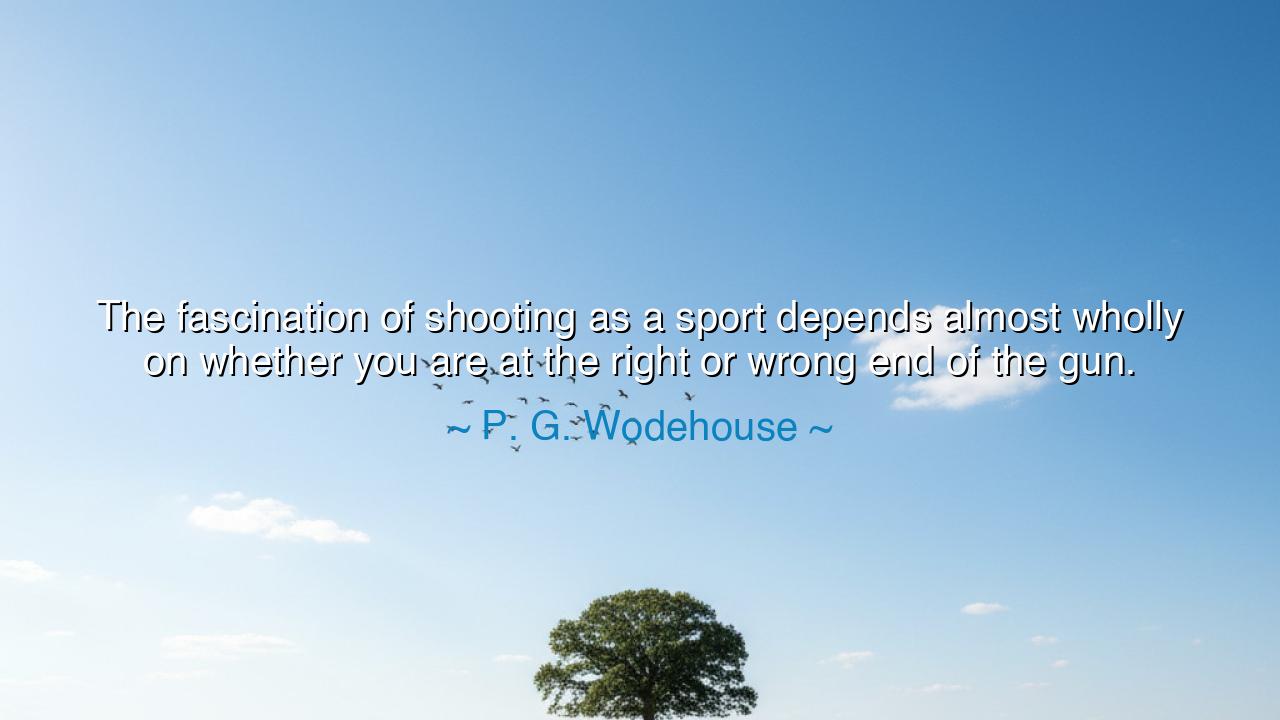
The fascination of shooting as a sport depends almost wholly on
The fascination of shooting as a sport depends almost wholly on whether you are at the right or wrong end of the gun.






In the age when laughter carried the weight of truth and satire spoke where sermons could not, the gentle sage of humor, P. G. Wodehouse, gave the world this timeless jest: “The fascination of shooting as a sport depends almost wholly on whether you are at the right or wrong end of the gun.” Though wrapped in wit, this saying holds the gleam of deep wisdom. It reminds us that perspective is everything — that what seems noble, thrilling, or justified to one may appear cruel, absurd, or deadly to another. Wodehouse, with his gift for grace and irony, exposes the eternal imbalance between power and vulnerability, between the hunter and the hunted. His laughter, though light, carries the echo of compassion.
In the surface of his words lies a simple truth about sport, but beneath it shimmers a profound commentary on life itself. To be “at the right end of the gun” is to hold advantage — to act rather than to suffer, to command rather than to endure. To be “at the wrong end” is to stand in peril, subject to another’s will. Wodehouse, the master of comedy born of manners and mischief, saw that much of human society mirrors this relationship. The world delights in its pursuits, its competitions, its hierarchies — yet few pause to ask: who, in this game of life, stands at which end of the weapon? And thus he laughs, not in cruelty, but to awaken understanding: that pleasure without empathy is but ignorance disguised as joy.
Consider the old tale of King Henry II and Thomas Becket, friends turned foes in the thrones of power. When Becket rose from companion to conscience, defying the king’s will in defense of faith, Henry’s fascination with authority turned to wrath. The king’s command — half jest, half fury — sent knights to strike Becket down at the altar. In that instant, the mighty who had once laughed at their power now saw its horror reflected in the blood of the innocent. The “sport” of dominion, like Wodehouse’s metaphorical shooting, was delightful only to those who held the weapon. To those beneath its aim, it was terror and sacrifice. And thus history confirms the humorist’s insight: the fascination of power, like the sport of shooting, depends entirely on one’s position in the encounter.
The ancient philosophers spoke similarly, though with fewer smiles. Marcus Aurelius, emperor and stoic, warned that man’s judgments are shaped by vantage, not truth. “Everything we hear,” he wrote, “is an opinion, not a fact.” Wodehouse, with laughter rather than lament, makes the same point — that one’s sense of justice, excitement, or righteousness often shifts when one changes sides. To the conqueror, war is glory; to the fallen, tragedy. To the hunter, the chase is exhilarating; to the deer, it is the end of peace. The humorist thus becomes the philosopher, for he teaches that empathy begins when one imagines life at the other end of the gun.
We see this wisdom again in the life of Mahatma Gandhi, who turned the gun of empire into a mirror. When the British wielded their rifles in the name of order, Gandhi offered no weapon but the power of conscience. He made his oppressors see themselves through the eyes of the oppressed — to feel, for a moment, what it meant to stand at the wrong end of history’s gun. And in doing so, he transformed the game. The empire’s “sport” became its shame, and peace, once mocked as weakness, became the ultimate strength. This is the transformation Wodehouse hints at beneath his laughter: when perspective shifts, cruelty loses its glamour, and power yields to understanding.
Thus, the humor hides a moral flame: beware the blindness of privilege. The world often delights in its victories without seeing who bleeds beneath them. Those at “the right end” of the metaphorical gun — the strong, the fortunate, the triumphant — must remember that the fascination they feel may be built upon another’s fear. To live wisely is to see from both ends, to temper enjoyment with compassion, to wield strength with humility.
Therefore, O seeker of wisdom and mirth, learn from Wodehouse’s jest as from an oracle wrapped in laughter. Whenever life grants you power — over others, over fate, over chance — pause and ask: Would I still call this sport if I stood on the other side? Let this question be your compass. For only by imagining yourself at the wrong end of the gun can you act rightly at the right end of it.
So live not as the careless hunter, but as the awakened soul who laughs without cruelty, wins without pride, and spares when he might strike. In that balance lies true mastery — not the mastery of others, but of oneself. For humor is not mere escape, as Wodehouse teaches; it is revelation. And when you can smile with empathy — seeing both the hunter and the hunted — you will have learned the deepest lesson of all: that the joy of life lies not in taking aim, but in lowering the weapon and choosing to understand.






AAdministratorAdministrator
Welcome, honored guests. Please leave a comment, we will respond soon